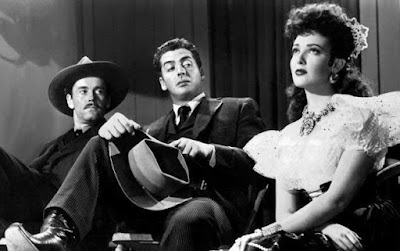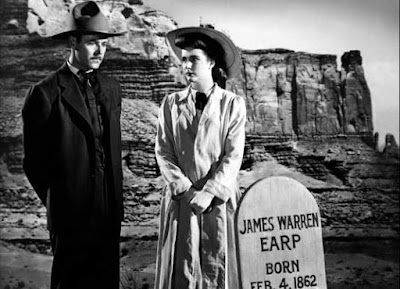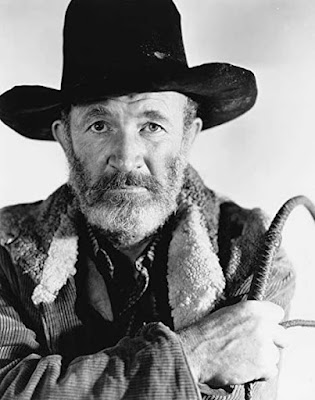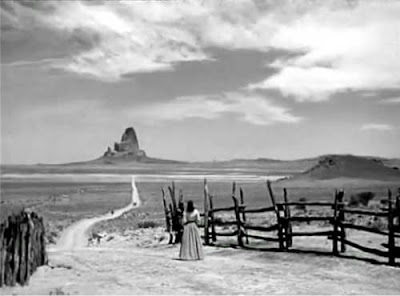From the first shot in the film of Henry Fonda as Wyatt Earp close-up with
the grandeur of Monument Valley in the background, it is clear that director
John Ford is aspiring to myth-making and he continues to do so with that
background always present as if to say what are mere mortals compared to
God's work. Ford's camera set-ups throughout the film are sublime and catch
the essence of the West, of individuality versus the community, of good vs
evil, of stoic heroism vs craven villainy. This is a masterpiece of the Western
and it barely has a shot in it until the end. And when it finally arrives
at the O.K. Corral it is almost anti-climactic because it was everything
that led up to it that matters. Ford hadn't wanted to make this film
but a contract with 20th Century Fox forced him to, so he basically remade
the The Frontier Marshal from 1939 directed by Alan Dwan and starring Randolph
Scoot. He makes some important changes - softens up the bar girl in love
with Doc Holliday, plays with some of the historical facts and deepens the
narrative. Though Frontier Marshal was an ok Western that was on the edge
of being a B film, this shows what a Master can do with the same material.
Considered by many critics to be the best Western ever made. That would of
course be another Ford film, The Searchers.

Ford loved the beautiful ruggedness of Monument Valley and used it often
to showcase his heroes - that first shot of John Wayne on the road with it
behind him in Stagecoach made him a star. Here he uses it more poetically
- with Wyatt at the graveside of one of his brothers, saying goodbye to Clementine
at the end, the quiet moments before the showdown begins - it is always there
in the background. Solitary and reaching for the skies. Fonda is a monument
of his own in the way Ford shoots him - often from below looking up, laconic,
lean and heroic. He and his brothers are bringing cattle to market when the
three brothers - Wyatt, Morgan (Ward Bond in his third version of these events),
Virgil (Tim Holt) go into Tombstone for a shave and a drink. While being
shaved a drunk shoots up the town and the Marshall is afraid to go in after
him (Bonds role in Frontier Marshall). So, Wyatt does - the drunk is played
by the same actor in that role as in Frontier Marshall - Charles Stevens
whose publicity claimed that he was the grandson of Geronimo.

They offer Wyatt the job of Marshall, he turns it down till they get back
to the herd and it is gone and his brother shot in the back. He takes the
job but the film is in no rush. Though he suspects the Clantons - father
and four sons - he sits back plays poker, makes friends with Doc Holliday
(Victor Mature), scolds the sultry bar girl (Linda Darnell) and just waits.
As in Frontier Marshall, the ex-lover (Cathy Downs) of Doc arrives in town
to find him full of self-hate and unworthiness. There are so many fine moments
- the drunk Shakespearean actor (Alan Mowbray - a theatrical actor) who finds
a moment of clarity and gives a lovely rendition of the To Be or Not To Be
monologue which Doc has to finish for him. The tune My Darling Clementine
softly breaking out when Clementine arrives by stage and Wyatt is gob smacked
with love. The dance at the Church to be. Classic quiet moments that stick
with you. The faces of the ordinary folks. With Ford, getting them
right was important to him - no one stands out but they all feel real.

It all builds up slowly to the famous O.K Corral - with Wyatt, Morgan and
Doc matching up against the Clantons. Walter Brennan in what has to be one
of his meanest roles is the father. He seethes with hate and a sense of not
belonging. His sons have been brought up to be pit bulls in his image.
He is great. Soaked in evil. Once he whips his boys when one draws his gun
and Earp shoots in out of his hand. "When you pull your gun, you have to
kill someone.". Like most of the films about Earp it is historically a mess
but what a brilliant film.





